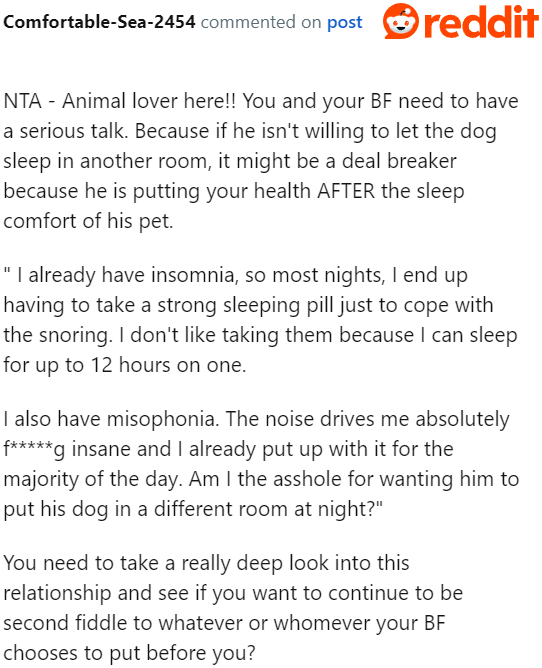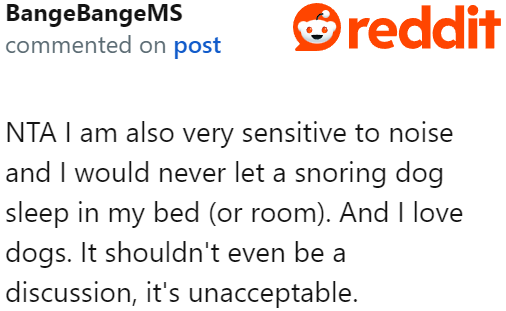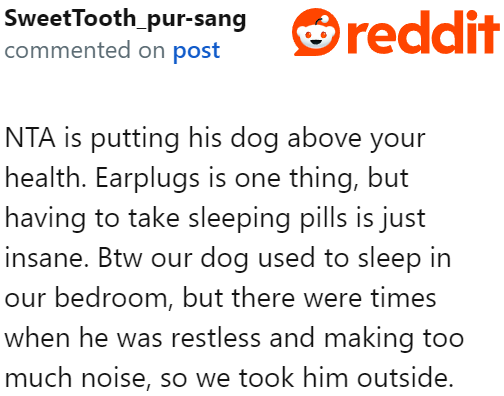Insomniac Woman Wants Boyfriend’s Snoring Dog to Sleep in Another Room, Wonders If She’s the A-Hole
French bulldogs were bred by mixing dogs with smaller snouts, such as terriers and pugs, which has led to numerous health issues for the breed. All flat-faced dogs struggle with breathing to some degree, but Frenchies are especially noisy, heavy breathers because they don't get enough oxygen.
While most pet owners understand a Frenchie's plight, one Redditor felt the need to set boundaries so she could sleep soundly in her bedroom. Over at the "Am I The A**hole?" (AITA) subreddit, a woman shared her issue with her boyfriend's French bulldog.
She explained that she's been with her boyfriend for a year, and his 9-year-old Frenchie is a sweet dog but has severe breathing issues, leading to loud, intense snoring. The snoring is so disruptive that it not only keeps her awake but also causes physical discomfort when the dog is near her.
Despite having insomnia, her boyfriend insists that the dog sleeps in their bed, which forces her to take strong sleeping pills to get any rest. This situation is especially tough for her because she also suffers from misophonia, making the noise even more unbearable.
Although she loves dogs and has two corgis of her own, they sleep in a different room due to their shedding. She wonders if she's in the wrong for wanting to move her boyfriend's dog out of the bedroom at night to finally get some peace and sleep.
The OP asks:

The OP, a dog lover, is in a relationship with a guy who owns a loudly snoring Frenchie.

The Impact of Sleep Disruption on Relationships
Sleep disruption, particularly due to external factors like a partner's snoring, can have significant psychological effects on relationship dynamics.
Research indicates that a lack of sleep can exacerbate irritability, reduce emotional regulation, and lead to increased conflict between partners.
According to studies published in the Journal of Sleep Research, sleep deprivation can impair cognitive function, making it difficult to address relationship issues effectively.
The boyfriend wants his Frenchie to sleep in the same bedroom as them — and this is an issue for the OP.
The Frenchie's loud snoring is driving the OP nuts. She's already an insomniac, and she has to deal with the noise.

She wonders if she's an a-hole for wanting the dog to sleep in another room.

From a behavioral standpoint, addressing the issue of snoring requires a balance of empathy and assertiveness.
Research shows that couples who communicate openly about sleep-related issues often experience greater satisfaction in their relationships.
Encouraging dialogues about sleep preferences and needs can foster understanding and cooperation, reducing resentment and frustration.
She also tells the community that her two dogs sleep in a different room.

This issue is something that requires a serious discussion between the couple.
If the OP's request is a deal breaker for the boyfriend, then this relationship might lead nowhere.

Exploring Solutions for Sleep Issues
Practical solutions for managing snoring can include lifestyle changes, such as weight management, sleep position adjustments, and even seeking medical advice.
According to studies, couples who work together to address sleep issues often report improved relationship satisfaction and emotional connection.
Incorporating relaxation techniques and establishing a calming bedtime routine can also enhance sleep quality for both partners.
This should have been a discussion before they moved in together.

A Redditor suggests sleep divorce.

In this situation, it seems the boyfriend's priorities might be a bit off. While his love for his Frenchie is understandable, his girlfriend’s health and well-being should come first.
One Redditor even suggested the idea of a "sleep divorce," where couples sleep in separate rooms to preserve their relationship and health. If her request to move the dog out of the bedroom is a deal breaker for him, it could indicate deeper compatibility issues, and the relationship might be heading for trouble.
Even other pet owners would do the same thing as the OP.

The boyfriend has the wrong priorities.
Even if he loves his Frenchie enough to want it in the same room at night, he should prioritize his girlfriend's health.

Moreover, creating separate sleeping spaces can sometimes be a viable solution for couples struggling with sleep disruption.
Research indicates that some couples find success in maintaining their individual sleep environments, which can lead to improved rest and overall relationship satisfaction.
Having a conversation about this option can help alleviate feelings of guilt and encourage mutual understanding of each other's needs.
Psychological Analysis
This situation underscores the psychological complexities surrounding sleep disruption and its effects on relationships.
From a psychological perspective, addressing these issues collaboratively can enhance emotional intimacy and relationship satisfaction, fostering a deeper understanding between partners.
Analysis generated by AI
Analysis & Alternative Approaches
In conclusion, managing sleep disruption and its impact on relationships involves understanding and addressing the underlying psychological and behavioral factors.
By fostering open communication and collaboration, couples can navigate these challenges more effectively, leading to healthier relationships and improved sleep quality.
Recognizing the importance of each partner's needs can create a more supportive and nurturing environment.
Ultimately, addressing sleep issues in a relationship requires a collaborative approach, where both partners feel heard and respected.
Research supports the idea that couples who engage in shared problem-solving often experience a greater sense of partnership and intimacy.
By prioritizing open communication and empathy, couples can navigate these challenges more effectively.



